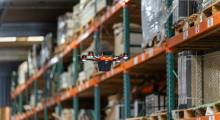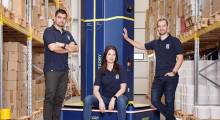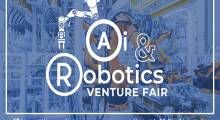The Advanced Robotics for Manufacturing Institute (ARM) recently announced the selection of six new technology projects for funding from its 24-01 Technology Project Call.
The call centered on special topic areas including multi-modal inputs for AI robotics in manufacturing, rapid re-tasking and robot agility, multi-robot multi-human collaboration, and virtual commissioning of advanced robotic systems.
The ARM Institute is a Manufacturing Innovation Institute funded through the U.S. Department of Defense. ARM said its projects bridge gaps among industry, government, and academia to spur impactful innovations that strengthen U.S. manufacturing.
By releasing project calls to its over 400 member organization consortium, ARM said it is able to connect groups that otherwise would not be able to collaborate to advance technologies that can address manufacturing challenges.
$6.1 million total contribution for U.S. manufacturing technology development
The ARM Institute plans to award around $2.9 million in project funding, for a total contribution of approximately $6.1 million across these six projects.
To date, ARM has catalyzed more than 100 robotics technology and workforce development projects.
“The ARM Institute congratulates these project teams on their selection,” said Chuck Brandt, ARM Institute CTO. “These projects epitomize the importance of enabling collaboration between diverse organizations to address areas of need in manufacturing. The ARM Institute is honored to enable collaboration between these groups and support these important projects.”
Projects include welding, grinding, spray coating, automotive, garment manufacturing
Automated T-shirt assembly system
Principal investigator: Henderson Sewing Machine Company Inc.
Project Team: HanesBrands Inc., Apparel Robotics, Southwest Research Institute, Interface Technologies, and MassRobotics
Description: The apparel industry is a manufacturing sector that is ripe for automation and a keen strategic focus for ARM. The Institute has funded several robotics projects centered on apparel manufacturing with each building on prior outputs and lessons learned.
This project will design, develop, and test a robotic system that automates six operations involved in T-shirt manufacturing to demonstrate sewn garment automation feasibility in a manufacturing environment.
Demonstration of rapid TPC welding at scale
Principal investigator: RTX Technology Research Center
Project Team: Carnegie Mellon University, Wason Technology LLC., Collins Aerospace
Description: Lightweight, carbon-fiber reinforced thermoplastic composites (TPCs) are recognized as a key material capable of meeting the future aerospace market high-rate demands, while also providing sustainability benefits. One challenging, but key enabler of high-rate TPC manufacturing is welding.
In a prior ARM Institute-funded project called Rapid Welding of Thermoplastic Composite Structures, robotic continuous ultrasonic welding was shown to increase the speed of induction. This project will build on the outputs from the prior project in order to scale it to production use.
Fixtureless robotic assembly and manufacturing environment (FRAME) 2.0
Principal Investigator: Lockheed Martin
Project Team: University of Southern California, Carnegie Mellon University, and Yaskawa Motoman
Description: This project will build on the outputs from the ARM Institute-funded FRAME project. FRAME is a fixtureless high mix/low volume (HMLV) manufacturing cell with widespread applicability to both defense and commercial manufacturing challenges, highlighted by human-machine interaction and cobot technologies to increase efficiency, reduce downtime, and increase cell yield.
FRAME 2.0 will center on addressing a wider range of part sizes and complex assembly scenarios and advancing the project into a functional pilot line.
Adaptive robotic insertion of automotive parts using multi-modal AI
Principal investigator: ThoughtForge AI
Project Team: Siemens and Magna International
Description: In automotive, aerospace, and consumer electronics manufacturing, adaptive insertion is performed by humans due to the need to apply and adjust force in real-time to successfully insert asymmetrical, oddly shaped objects.
A key enabler for the adoption of autonomous adaptive insertion systems is a multi-modal AI that uses real-time information from force sensors, combined with novel machine learning (ML) techniques, and new edge computing techniques to adaptively insert parts of varying shapes, sizes, and weights needed for assembling items within different industries.
This project seeks to integrate multi-modal AI inputs, ML algorithms, new computing techniques, and sensors into a robotic system that will enable robots to operate flexibly for a broad class of adaptive insertion applications.
Automated finishing of castings through parting line grinding
Principal investigator: CapSen Robotics
Project Team: The Ohio State University, Southwest Research Institute, and Yaskawa Motoman
Description: Metal casting offers considerable flexibility in a component’s size, shape, and material and often operates in the low volume, high mix manufacturing regime. Castings often have highly variable features/defects that need to be removed or post-processed. Finishing processes today are typically completed manually due to variability. These manual processes can lead to errors, higher costs, and slower speeds.
This project team will develop a robotic finishing cell that autonomously finishes castings. The system will image the cast component using machine vision, reconstruct a 3D model of the part, identify parting line flash, create a tool path and motion plan for performing the grinding operation, and execute robotic grinding - all with limited human intervention and no explicit CNC programming.
Agile robotic path planning for spray coating of complex geometry
Principal investigator: Northrop Grumman Corporation
Project Team: Manufacturing Automation Systems (MAS) and the Ohio State University
Description: First-time quality is difficult to achieve in current high tolerance, large, complex robotic coatings applications within the Defense Industrial Base, leading to excessive manual rework, re-programming, and increased product lead time.
Challenges with mapping complex surface geometries to ensure surface coverage without overspray onto other surfaces makes the coating and finishing of complex geometry parts difficult. This project team will seek to create autonomous robotic path planning software for coating and finishing of complex geometry that can leverage metrology measurement data.
Annual ARM member meeting to be held in September
ARM Members can learn more about these projects at its upcoming annual member meeting. Open only to ARM Institute Members, the member meeting will take place Sept. 23-25 in Pittsburgh, PA.
This event will bring together representatives from across ARM’s member organizations for two and a half days of networking, collaboration, and knowledge-sharing.
Article topics
Email Sign Up
















